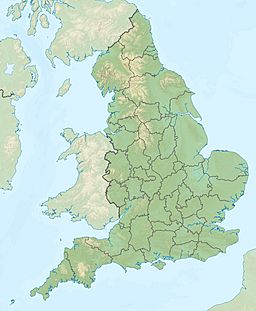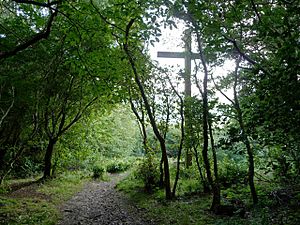Selworthy Beacon facts for kids
Quick facts for kids Selworthy Beacon |
|
|---|---|
Selworthy Beacon from Porlock Weir
|
|
| Highest point | |
| Elevation | 308 m (1,010 ft) |
| Prominence | 193 |
| Parent peak | Dunkery Beacon |
| Geography | |
| OS grid | SS918479 |
| Climbing | |
| Easiest route | Hike |
Selworthy Beacon is a cool hill in Exmoor National Park, Somerset, England. It's a special type of hill called a "Marilyn," which means it's at least 150 meters (about 492 feet) higher than the land around it. You can find it north of the village of Selworthy and northwest of Minehead.
A road goes right to the top of Selworthy Beacon. When you get there, you'll see a sign from the National Trust. From the summit, you can enjoy amazing views of the south coast of Wales across the Bristol Channel. The famous South West Coast Path also goes up the hill, almost reaching the very top.
Exploring Selworthy Beacon
Selworthy Beacon is in the northern part of Somerset, in southwestern England. It's about 4 miles (6.4 km) northwest of Minehead. This hill is one of three main peaks in Somerset. The other two are Dunkery Beacon and Periton Hill. Selworthy Beacon stands tall at about 1,013 feet (308 meters).
Right behind the hill, there are steep cliffs that drop down. Selworthy Beacon is part of the Holnicote Estate, which is owned by the National Trust. Close by, you can find popular walking trails like the Macmillan Way and the Coleridge Way. There's also a very old tithe barn from the 1300s nearby. You can follow a marked walking path to the hill through the woods of Allerford and Holnicote Plantations. This path is about 2 miles (3.2 km) northeast of Porlock.
A Look Back in Time
Near the top of Selworthy Beacon, you'll see several piles of stones called cairns. People think these cairns are what's left of ancient burial mounds called round barrows. There's also an old fort from the British Iron Age called Bury Castle. These old stone piles are protected as an ancient monument.
Hundreds of years ago, in the 1500s, Selworthy Beacon was used as a lookout point. Its name even comes from this! A beacon (a signal fire) would be lit here to warn people if invaders were coming. Not far from the hill, about 0.25 miles (400 meters) away, is the burial place of Sir Thomas Dyke Acland, 10th Baronet.
Wildlife and Nature
Selworthy Beacon is located on the eastern slopes of Exmoor National Park. This park covers a large area of about 267 square miles (692 square kilometers). You can reach Selworthy Beacon from Porlock by going through Allerford.
Along the coast near Selworthy Beacon, you can spot many plants that love the sea air. These include Sea Campion and Thrift (which is also called Armeria maritima). You'll also see lots of gorse, which has bright yellow flowers, and purple heather (Calluna vulgaris). These plants make the landscape very colorful and beautiful.
 | James Van Der Zee |
 | Alma Thomas |
 | Ellis Wilson |
 | Margaret Taylor-Burroughs |




